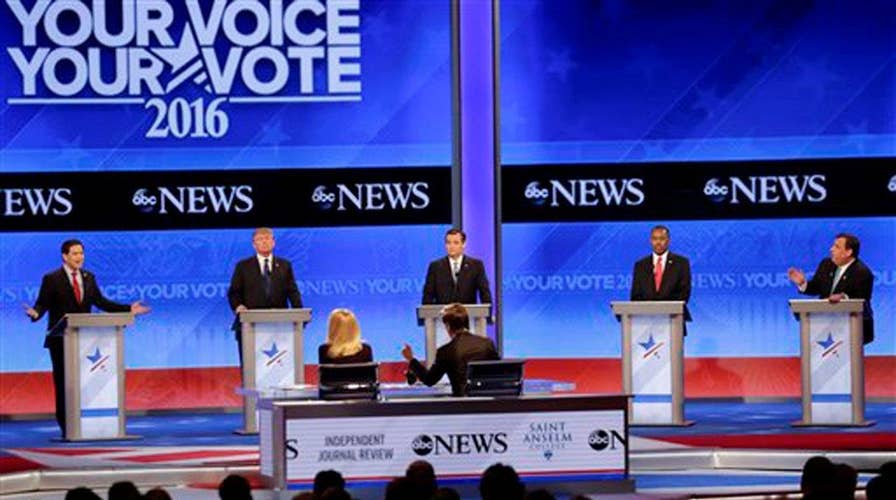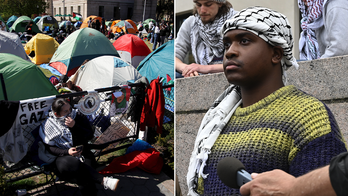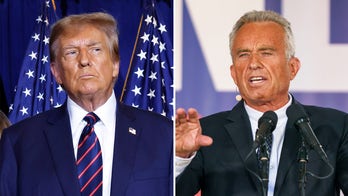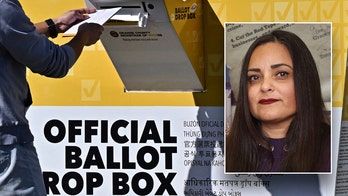Presidential rivals target Marco Rubio at GOP debate
Analysis of ABC's Republican debate ahead of New Hampshire primary on 'America's Election HQ'
The top tier in the Republican presidential race endured hard-hitting and sustained attacks on the debate stage Saturday night, with Florida Sen. Marco Rubio in particular getting pelted by New Jersey Gov. Chris Christie for skipping Senate votes and leaning on anti-Obama “talking points” on stage.
The debate in New Hampshire – their last before the state’s upcoming primary – saw the middle-tier candidates scrapping to gain traction, frequently putting the top three finishers in Iowa’s caucuses on defense over their records. Texas Sen. Ted Cruz faced renewed criticism over his campaign’s questionable caucus-night tactics, while billionaire businessman Donald Trump took heat from his old sparring partner Jeb Bush – and even the audience – over a development project.
But it was the clashes between Christie and Rubio that became most heated, and Rubio seemed to struggle at times to push past the tough-talking governor’s critique of his record.
“You have not been involved in a consequential decision where you had to be held accountable, you just simply haven’t,” Christie said. Pointing to a sanctions bill, Christie said Rubio skipped the vote, adding: “That’s not leadership, that’s truancy.”
Rubio fired back that Christie didn’t return to New Jersey during the recent snowstorm until he was pressured. “They had to shame you into going back,” Rubio said.
But Christie seized on a recurring effort by Rubio to look past his GOP rivals by repeating a line about President Obama trying to “change this country.”
“There it is. The memorized 25-second speech,” Christie said, mocking Rubio’s allegedly rehearsed “talking points” on Obama. When Rubio again accused Christie of not wanting to return to New Jersey for the storm, Christie shot back: “Is that one of the skills you get as a United States senator – ESP?”
With the polls tightening ahead of Tuesday’s primary, several Republican contenders on stage were looking for a late breakout, and Christie was unquestionably one of them. Whether his debate-stage attacks can knock Rubio off his stride and hurt his momentum going into Tuesday’s primary remains to be seen. But Christie’s attacks were aimed squarely at questioning Rubio’s experience, an issue that the governors in the race have raised before.
Christie later went after Rubio for backing away from immigration reform legislation he once co-authored, saying he didn’t “fight” for it. Rubio countered that the plan has “no chance of passage” until the American people are convinced illegal immigration is under control.
Cruz, too, was sharply criticized by Ben Carson over representatives of his campaign incorrectly spreading rumors on Iowa caucus night that he was dropping out of the race. It was a rare moment, as the normally non-confrontational Carson detailed the resources that have gone into his White House bid and questioned why Cruz’s team would say he was suddenly leaving the race on the night of the first contest.
“To think that I would just walk away just 10 minutes before the caucus … I mean, who would do something like that?” he said. Carson called the rumors a good example of “certain types of Washington ethics … Washington ethics basically says, if it’s legal, you do what you need to do in order to win.”
Cruz, the Iowa caucus winner, insisted he “knew nothing about” the election night rumors, and again apologized.
“Ben, I’m sorry,” he said.
Trump needled Cruz on the same controversy in his closing remarks, saying of his Iowa victory, “That’s because you got Ben Carson’s votes, by the way.”
Cruz also had an awkward moment toward the end of the debate, when asked by the moderators about his stance on waterboarding. He said it’s “enhanced interrogation” and not technically torture, and he would not bring it back “in any sort of widespread use.” He then paused for several seconds, before resuming to recall legislation he backed prohibiting line officers from employing the technique – and say he’d use whatever “enhanced” methods needed to protect America.
Trump was unequivocal. “I’d bring back a hell of a lot worse than waterboarding,” he said.
The Saturday night debate, hosted by ABC, was the candidates’ last before the New Hampshire primary. It also marked Trump’s return to the stage – after he sat out the last debate over a dispute with debate host Fox News. But he returned for the face-off in Manchester, N.H., with his front-runner status now in jeopardy, after Cruz bested him in the leadoff Iowa caucuses and Rubio pulled off a strong third-place finish that has given his campaign fresh momentum.
Yet it was former Florida Gov. Bush who put Trump on his heels at Saturday’s debate, in a dispute over eminent domain – the government power to seize property that Trump has supported.
“It’s a necessity for our country,” Trump said.
Bush then accused Trump of using eminent domain to take property from an elderly woman for a project in Atlantic City. After Trump denied it and then accused Bush of trying to be a “tough guy,” Bush asked, “How tough is it to take property from an elderly woman?”
Trump at that point essentially took on the audience, which booed him repeatedly as he then accused them of being Bush’s “donors and special interests.” Trump got the final word, telling Bush that the Canada-to-Texas Keystone pipeline they support is a “private job” that needs eminent domain to be completed. (According to local reports, the New Jersey woman in question ultimately kept her home by fighting the city in court, though she moved out several years ago.)
Despite being jeered by the audience for his “donor” charge, Trump did receive applause for his explanation of his position on health care. He vowed to repeal ObamaCare and replace it, but said, “We’re going to take care of people that are dying on the street.”
Trump, earlier, also defended his “temperament,” challenging criticism from Cruz that Trump would be a trigger-happy commander in chief.
“I actually think I have the best temperament,” Trump said.
Earlier this week, Cruz responded to Trump’s criticism of his Iowa caucus tactics by questioning his temperament and joking that with Trump in charge, Americans could wake up and find he’s “nuked Denmark.”
Trump reminded the audience at Saturday’s debate that he did not back the Iraq war.
“I was the only up here who said don’t go, don’t do it,” Trump said.
He also mocked Cruz, after the senator did not respond directly whether he stands by his words.
“He didn’t answer your question,” Trump noted. “People back down with Trump, and that’s what I like, and that’s what the country is going to like.”
Trump still leads in New Hampshire, but recent polls show Rubio surging in the state, which votes Tuesday.
The debate at St. Anselm College featured the seven top-polling candidates. Former HP CEO Carly Fiorina and former Virginia Gov. Jim Gilmore did not make the cut.
It started with a hiccup, as the moderators appeared to, temporarily, forget to invite Ohio Gov. John Kasich to the stage. He then walked on. Still, Kasich fielded several questions at the debate, challenging his GOP rivals on suggestions they would deport millions of illegal immigrants.
He also talked tough, as other candidates did, about North Korea on the heels of reports that they launched a long-range missile.
“We cannot continue to be weak in the face of the North Koreans,” Kasich said.
Unlike in Iowa, the battle for the not-Trump vote is crowded and competitive in New Hampshire. Aside from Cruz and Rubio, Kasich and Bush are also polling well in the state. Christie had been running strong as recently as January but has seen his numbers slide in recent weeks.
Cruz, later on in Saturday’s debate, was by turns tough and tender. He reiterated his goal to use “overwhelming air power” to take out the Islamic State. Citing reports about the emergence of a “jihadist university” in ISIS territory, he said that building “should be rubble” but added he’d wait until “freshman orientation” to destroy it.
Later, he told the story of his half-sister Miriam who died of an overdose, speaking about addiction in a state where the problem is at crisis levels.
“This is an absolute epidemic, we need leadership to solve it,” Cruz said.
Fiorina, and even some rival candidates, had lobbied ABC and the Republican National Committee to let her debate Saturday despite the criteria disqualifying her. But ABC stood firm in its decision to stick by criteria announced before Monday’s caucuses, after which three GOP candidates dropped out.





